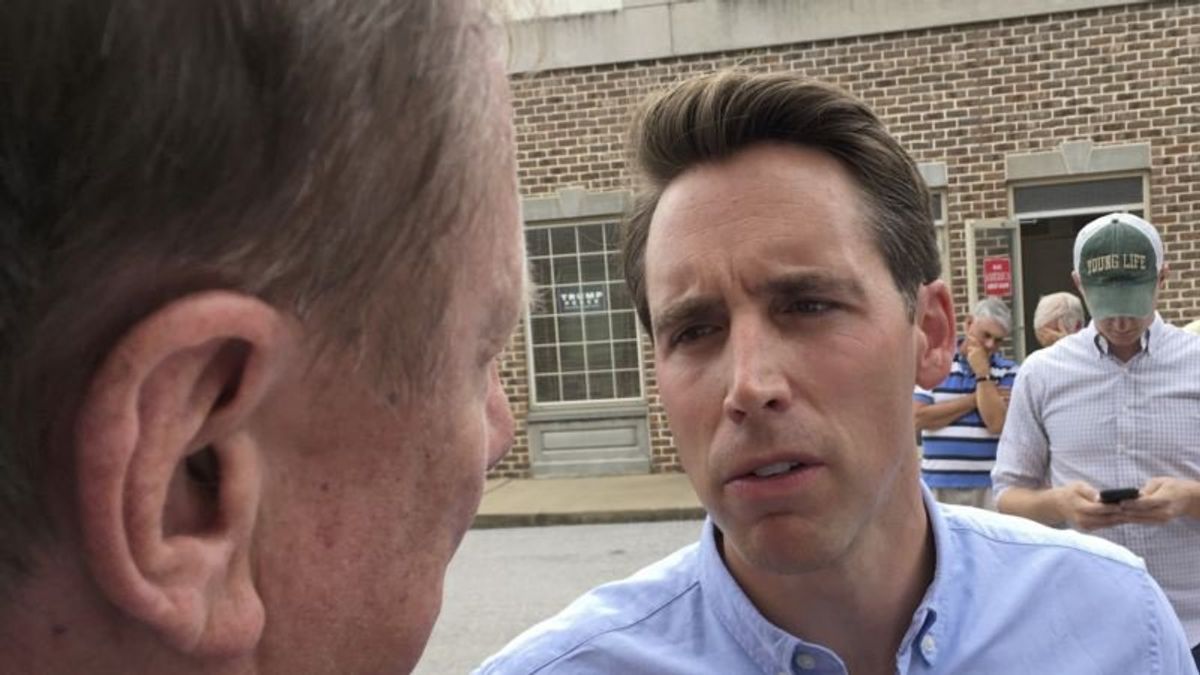
Trump Tariffs Put Missouri Senate Candidate Hawley in a Bind
Trump Tariffs Put Missouri Senate Candidate Hawley in a Bind

JEFFERSON CITY, MO. —
The fate of a Missouri nail manufacturer suffering under President Donald Trump's steel tariffs has put Republican Senate candidate Josh Hawley in a bind between his support for the president's trade strategy and a local plant that says it could be forced to close.
Mid Continent Nail Corporation says it could shutter its Poplar Bluff plant, which employs about 335 workers, as early as this month without an exemption to tariffs, the site's Operations General Manager Chris Pratt told reporters in early September. The company previously had said that it might not survive through Labor Day but stayed open.
After Trump imposed a 25 percent tariff on imported steel, the company in June cut 60 of 500 positions at the plant in rural Butler County, where the unemployment rate is above the national average and the company is the area's second-largest employer. Pratt said many employees also have left because of the uncertainty, and the company is not replacing those workers.
"Right now we're counting on Josh Hawley, who says he has a good relationship with President Trump, to save the 500 jobs in Poplar Bluff, Missouri," Pratt said after Labor Day.
Trump imposed tariffs in March, saying a reliance on imported metals threatened national security. He initially exempted Canada, Mexico and the European Union to buy time for trade negotiations, but tariffs for those countries took effect in May after talks stalled.
Mid Continent is owned by Deacero, a private Mexican company, which supplies steel for the nails made in Missouri. Company spokeswoman Elizabeth Heaton said nails are sold throughout the U.S., Canada and the Caribbean and used for industrial pallets, crating for transportation and residential construction.
Hawley, the state attorney general, and Democratic incumbent Sen. Claire McCaskill are sparring in one of the most closely-watched Senate races in the nation, with Republicans' 51-49 majority at stake on November 6. Both candidates visited the plant after tariffs began and both say they're fighting for Mid Continent, but the issue is more delicate for Hawley.
Missouri is one of several Senate races including North Dakota, Indiana and Montana, where Republican candidates are on the defensive as trading partners retaliate against agricultural and manufacturing products from the U.S. in response to Trump's tariffs.
In Missouri, Hawley says he supports Trump's goal of getting tough with trading partners to get better deals for the U.S. and urges patience to see results from the negotiations. The Trump administration recently said it reached a deal with Mexico to update the North American Free Trade Agreement and is now negotiating with Canada to finalize it.
In an August letter to Deacero, Hawley says the company makes a strong case for an exemption and urges the Department of Commerce to grant it quickly.
But an exemption is unlikely to be granted quickly. The federal government has been deluged with requests for exemptions, the process is slow and some U.S. steel producers have objected to Mid Continent getting favorable treatment, saying the company could switch to U.S. suppliers.
Pratt said the plant also buys American steel, but he said there's not enough to meet the company's needs and noted that domestic prices rose steeply with the tariffs.
Hawley has also put pressure on the plant's Mexican parent company to keep it open.
"As a company with a global presence and many locations, Deacero is clearly not struggling to make ends meet," Hawley wrote in the letter. "The reality is that Deacero can afford to keep the factory open, and in turn, help keep men and women employed who simply want to do right by their families and earn a living."
Democrat McCaskill has gone on the attack over the company's plight, highlighting Mid Continent Nail during a June U.S. Senate hearing, pushing for the exemption and holding an August hearing in St. Louis to listen to concerns from Missouri businesses.
Instead of tariffs, McCaskill has advocated joining U.S. allies to take a stand against China's unfair trade practices and spending more money to enforce current trade laws through the United States International Trade Commission.
In a recent Facebook post, she used the tariffs as an example to paint Hawley as a rubber stamp to Trump.
"All across the state, farmers and manufacturers are telling me how they're being hurt by this trade war. That's why I'm calling for it to end," McCaskill wrote. "Hawley is supporting it because he doesn't want an inch of daylight between him and President Trump."
 The Latest: Cuomo, Nixon Vote in NY Primary ElectionNext PostUS Must Support Ethiopia’s ‘Fragile’ Reforms, Diplomat Says
The Latest: Cuomo, Nixon Vote in NY Primary ElectionNext PostUS Must Support Ethiopia’s ‘Fragile’ Reforms, Diplomat Says







